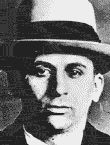Meyer Lansky
Meyer Lansky

Aug. 28, 1900, to Jan. 15, 1983.
Meier Suchowljansky
After World War II, Lansky and his brother Jake ran a gambling house near Miami known as the Colonial Inn, and they branched out with other gaming complexes in
Saratoga and Hollywood. Lansky later collaborated with Frank Costello in the opening of the Beverly Club just outside of New Orleans in 1946.
In '48, Florida began to act against casinos, and Lansky sold off Colonial Inn. Pressure by the U.S. government against organized
crime was mounting in the late 1940s, and Lansky was called before the Kefauver Committee Oct. 11, 1950.
Lansky's major investment, the Riviera Hotel in Havana, was lost when communist rebel leader Fidel Castro siezed control of the island nation and threw out the gangsters in 1960. The hotel, which
cost an estimated $14 million to build, had not be open long enough to recover more than a third of the initial investment.
Lansky's health suffered upon the casino's shutdown. He dealt with ulcers and chest pains and was hospitalized after a heart attack.
He eventually recovered but was hounded by federal law enforcement agencies for much of the rest of his life.
In the early 1970s, he attempted to retire to Israel. Under pressure from the U.S., which wanted Lansky back home to face charges of skimming from the Flamingo, the Israeli government refused his
request for permanent citizenship in 1971. Late in 1972, the Israeli Supreme Court backed the decision and Lansky was forced to attempt to find refuge elsewhere.
An airplane exodus took him first to Switzerland, then to Rio, then to Buenos Aires and on to Paraguay, where he hoped to set up a
quiet life for himself. But U.S. authorities headed him off, and Paraguayan officials refused to let Lansky off the plane. The aircraft continued on with stops in La Paz, Lima and Panama before
returning Lansky to Miami and the waiting American officials.
Lansky avoided conviction but three other attempts to go to Israel were blocked. He died in Miami Jan. 15, 1983.
Related Links:
-
Book - Mafia in Havana
by Enrique Cirules.
Lansky was a long-time friend and "business" associate of Charlie Luciano, Benjamin Siegel, Frank Costello and other big-name Prohibition Era gangsters.
He was born in Grodno, Russia, in 1900 or 1902, depending on the source of data. The Jewish community there was besieged and often assaulted by the surrounding Gentile community. The Jewish
families armed themselves and often fought back, causing Lansky's earliest memories to be of a state of Jewish versus non-Jewish warfare.
His family brought him and his brother Jake to America in 1911 - Ellis Island processing apparently changed his age from 10 to 8 and shifted his birthday from Aug. 28, 1900, to July 4,
1902.
The family settled in Brooklyn and a few years later moved to Manhattan's Lower East Side, where Lansky met and befriended Benjamin Siegel (called by some "Bugsy," but never to his face). An odd
friendship, apparently based on a mutual recognition of toughness, formed between Lansky and young Salvatore Lucania - later known as Charlie Luciano. Luciano, Lansky and Siegel cooperated on
some minor criminal enterprises, possibly working for Arnold Rothstein on occasion, and in scuffles with the nearby Irish-dominated gangs.
During Prohibition, the three did a fair share of rum-running and might also have worked at hijacking competitors' liquor shipments. When Luciano was absorbed into the Mafia organization of "Joe
the Boss" Masseria, Lansky and Siegel served as his advisors and enforcers.
After 1931, Lansky became a trusted financial adviser to the ruling Commission of the national crime Syndicate. He specialized in setting up gambling facilities in Miami and Cuba and initially
supported Siegel's vision of a gambling and entertainment Mecca in Las Vegas (retaining for many years a secret financial interest in the Flamingo).
